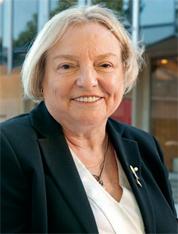Lillian Kraemer '64 Endows Public Interest Professorship

A bequest from Lillian Kraemer, ’64, will one day endow a tenured academic professorship at the Law School that will be focused on public interest law.
Dean Schill says, “Lillian Kraemer’s generous bequest—which we do not expect or hope to be utilizing any time soon—is in keeping with her unstinting commitment to the betterment of the Law School, her extraordinary strategic vision, and her demonstrated passion for serving the public interest.”
Kraemer, now retired from practice at Simpson Thacher & Bartlett where in the 1980s she developed the firm’s bankruptcy and reorganization practice, holds one of only four current lifetime appointments to the Law School’s Visiting Committee, and she served as an honorary cochair of the Law School’s centennial capital campaign.
Former Dean Saul Levmore has observed, “Lillian’s passion for, and belief in, the educational process is so fierce as to improve that process, at least as it takes place at Chicago.”
It is expected that the Lillian E. Kraemer Professor of Law will not only teach subjects related to the public interest, but serve as an advisor and mentor to students interested in practicing public interest law, complementing the activities of the Public Interest Law and Policy Program that was established last year. Levmore credits Kraemer with influencing many aspects of the Law School’s commitment to assertively supporting public interest law: “Lillian Kraemer inspired me to think hard not just about public interest opportunities after law school, but also about the process of advising students and encouraging their public interest sentiments while in law school.”
“As I interviewed prospective associates at Simpson Thacher over the years,” Kraemer reflects, “I would often find that they had learned practically nothing about public service opportunities while they were law students. I’m hoping this bequest will contribute to the strong momentum for changing that at the one law school that matters most to me and, by Chicago’s example, at others. It’s absolutely critical that the great law schools inspire and support public service so that our best lawyers remain keenly aware of their public responsibilities. We’ve seen what can go wrong when lawyers lose sight of this.”
Kraemer was the second woman to be named a partner at Simpson Thacher, and the first woman to chair its finance committee. After working on the Chrysler bailout between 1979 and 1981, she perceived the need for a formalized bankruptcy practice, and she was selected to establish and run that practice. Among the scores of major restructurings that she had a major role in were ones at International Harvester, Zapata, Baldwin United, Braniff, Pan Am, Orion Pictures, and Olympia and York.
She served for more than 12 years on the board of managers of her college alma mater, Swarthmore, and has been active for nearly 20 years (including a current term on the board of directors) at Legal Momentum (the Women’s Legal Defense and Education Fund), the nation’s oldest organization dedicated to advancing the rights of all women and girls. “Many of the problems that professional women face have not been solved yet, and that includes within the legal profession,” she says. “And the problems for less fortunate women in the current troubled economic and political environment are, if anything, becoming worse, not better.”
As one of just seven women in her class at the Law School, Kraemer says she found Professor Soia Mentshikoff “invaluably inspiring, as a role model and as a mentor,” and she says she is glad that her bequest will create another endowed chair named for a woman: “The more that women in law school have examples of other women to help them shape their perceptions of their opportunities, the better off they—and all of us—will be. I know from experience that it really matters.”
Kraemer says she sees her bequest as one way of demonstrating her gratitude for a great education. “The Law School made it possible for me for me to have a fulfilling life doing work that was challenging and satisfying,” she says. “I received an education that broadened my perspectives and expanded my intellectual life while at the same time it focused and sharpened my skills. Malcolm Sharp’s classes were the best educational experience I have ever had, anywhere; Karl Llewellyn, Harry Kalven, and Phil Kurland set incredibly high standards for what a lawyer should be that I have tried to live up to—the list of my great teachers could go on and on. Service to the Law School, and this bequest, are but small ways of paying back my debt to this great institution.”